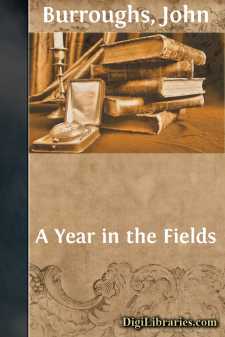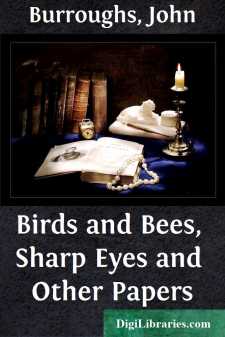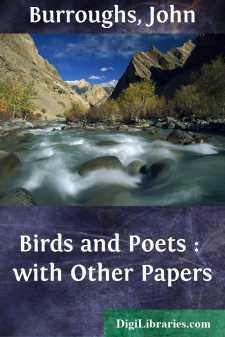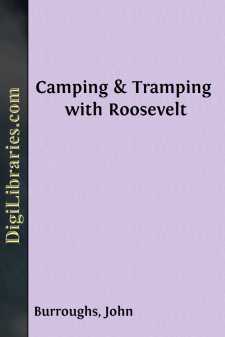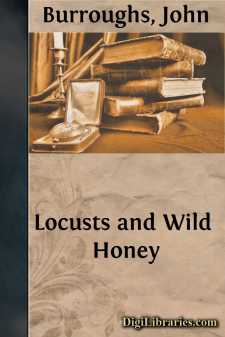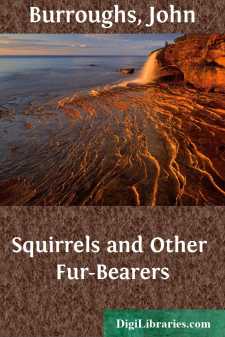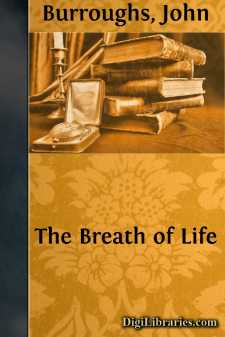Categories
- Antiques & Collectibles 13
- Architecture 36
- Art 48
- Bibles 22
- Biography & Autobiography 813
- Body, Mind & Spirit 142
- Business & Economics 28
- Children's Books 17
- Children's Fiction 14
- Computers 4
- Cooking 94
- Crafts & Hobbies 4
- Drama 346
- Education 46
- Family & Relationships 57
- Fiction 11829
- Games 19
- Gardening 17
- Health & Fitness 34
- History 1377
- House & Home 1
- Humor 147
- Juvenile Fiction 1873
- Juvenile Nonfiction 202
- Language Arts & Disciplines 88
- Law 16
- Literary Collections 686
- Literary Criticism 179
- Mathematics 13
- Medical 41
- Music 40
- Nature 179
- Non-Classifiable 1768
- Performing Arts 7
- Periodicals 1453
- Philosophy 64
- Photography 2
- Poetry 896
- Political Science 203
- Psychology 42
- Reference 154
- Religion 513
- Science 126
- Self-Help 84
- Social Science 81
- Sports & Recreation 34
- Study Aids 3
- Technology & Engineering 59
- Transportation 23
- Travel 463
- True Crime 29
John Burroughs
John Burroughs (1837-1921) was a renowned American naturalist and essayist, celebrated for his vivid writings on nature and rural life. His works, often reflecting his deep love for the natural world, contributed significantly to the American conservation movement. Burroughs was a contemporary of other notable naturalists such as John Muir and Henry David Thoreau, and his essays helped popularize nature writing in the late 19th and early 20th centuries.
Author's Books:
Sort by:
by:
John Burroughs
In the town of Roxbury, among the western Catskills, was born April 3, 1837, John Burroughs. The house in which he first saw the light was an unpainted, squarish structure, only a single story high, with a big chimney in the middle. This house was removed a few years later, and a better and somewhat larger one, which still stands, was built in its place. The situation is very pleasing. Roundabout is a...
more...
by:
John Burroughs
THE BLUEBIRD It is sure to be a bright March morning when you first hear the bluebird's note; and it is as if the milder influences up above had found a voice and let a word fall upon your ear, so tender is it and so prophetic, a hope tinged with a regret. There never was a happier or more devoted husband than the male bluebird. He is the gay champion and escort of the female at all times, and...
more...
by:
John Burroughs
BIOGRAPHICAL SKETCH.Nature chose the spring of the year for the time of John Burroughs's birth. A little before the day when the wake-robin shows itself, that the observer might be on hand for the sight, he was born in Roxbury, Delaware County, New York, on the western borders of the Catskill Mountains; the precise date was April 3, 1837. Until 1863 he remained in the country about his native...
more...
by:
John Burroughs
I BIRDS AND POETS "In summer, when the shawes be shene,And leaves be large and long,It is full merry in fair forestTo hear the fowlés' song.The wood-wele sang, and wolde not cease,Sitting upon the spray;So loud, it wakened Robin HoodIn the greenwood where he lay." It might almost be said that the birds are all birds of the poets and of no one else, because it is only the poetical...
more...
by:
John Burroughs
INTRODUCTION This little volume really needs no introduction; the two sketches of which it is made explain and, I hope, justify themselves. But there is one phase of the President's many-sided character upon which I should like to lay especial emphasis, namely, his natural history bent and knowledge. Amid all his absorbing interests and masterful activities in other fields, his interest and his...
more...
by:
John Burroughs
INTRODUCTION The eight essays in this volume all deal with the home region of their author; for not only did Mr. Burroughs begin life in the Catskills, and dwell among them until early manhood, but, as he himself declares, he has never taken root anywhere else. Their delectable heights and valleys have engaged his deepest affections as far as locality is concerned, and however widely he journeys and...
more...
by:
John Burroughs
THE PASTORAL BEES The honey-bee goes forth from the hive in spring like the dove from Noah's ark, and it is not till after many days that she brings back the olive leaf, which in this case is a pellet of golden pollen upon each hip, usually obtained from the alder or the swamp willow. In a country where maple sugar is made the bees get their first taste of sweet from the sap as it flows from the...
more...
by:
John Burroughs
WAITING Serene, I fold my hands and wait, Nor care for wind, nor tide, nor sea; I rave no more 'gainst Time or Fate, For lo! my own shall come to me. I stay my haste, I make delays, For what avails this eager pace? I stand amid the eternal ways, And what is mine shall know my face. Asleep, awake, by night or day, The friends I seek are seeking me; No wind can...
more...
by:
John Burroughs
SQUIRRELS Walking through the early October woods one day, I came upon a place where the ground was thickly strewn with very large unopened chestnut burrs. On examination I found that every burr had been cut square off with about an inch of the stem adhering, and not one had been left on the tree. It was not accident, then, but design. Whose design? A squirrel’s. The fruit was the finest I had ever...
more...
by:
John Burroughs
I I When for the third or fourth time during the spring or summer I take my hoe and go out and cut off the heads of the lusty burdocks that send out their broad leaves along the edge of my garden or lawn, I often ask myself, "What is this thing that is so hard to scotch here in the grass?" I decapitate it time after time and yet it forthwith gets itself another head. We call it burdock, but...
more...


